Text

The fallopian tubes play a crucial role in the female reproductive system. One, it is the place where the egg released from the ovary and sperm meet for fertilization. Second, it helps the fertilized egg to travel to the uterus. But sometimes, this can't happen. There are several possible reasons for it - the most common being a blocked Fallopian tube.
Common causes of blocked fallopian tubes include:
- Pelvic inflammatory disease
- Endometriosis
- Past ectopic pregnancy
- Past abdominal surgery
- Fibroids
- Sexually transmitted infections.
Fallopian Tube Catheterization Procedure:
Fallopian Tube Catheterization is performed to open the blocked fallopian tubes by a minimally invasive surgery called hysterolaparoscopy. It includes both hysteroscopy and laparoscopy. A guidewire is passed through the uterus to the tubes via a hysteroscope( a thin telescope-like device inserted into the uterus through the vagina ), and the blockage of the tubes can be cleared. Blockage opening can be confirmed immediately through laparoscopy ( a thin telescope-like device inserted through a small incision in a patient's belly button ). A contrast dye is passed through the cervix into the uterus and through the fallopian tube - spillage is visualized through a laparoscopy camera.
Thus hystero- laparoscopy is not only used for confirmation of tubal blockage but can sometimes also help in clearing the tubal blocks!
If you're struggling with fallopian tube blockage or other fertility-related issues, book your free consultation and visit the nearest Hegde Fertility Centre. Doctors at Hegde Fertility are always there to answer all your queries and help you achieve your dreams of parenthood.
📷: https://bit.ly/3t3iFwR
📷: 8880 747474
#hegdefertility#fallopiantubecatheterization#blockedfallopiantubes#fallopiantubes#fallopiantubeblockage#unblockfallopiantubes#tubalblockage#fallopian#fallopiantube#fallopiantubeblock#blockedfallopiantube#functionalfallopiantube#openfallopiantube#treatmentforfallopiantube#unblockfallopiantube#hysterolaparoscopy#women
0 notes
Text

Some women with low ovarian reserve, ovarian failure, thin endometrium, or women approaching menopause prefer to use their own eggs for pregnancy rather than opting for egg donation. PRP treatment has promising results in such cases by increasing the number of eggs and improving the endometrium thickness leading to a successful pregnancy.
In this procedure, the patient's blood is taken, and platelets are separated. These platelet-rich plasma are injected directly into the patient's ovaries or uterine endometrium, depending on the treatment objective under anesthesia.
To know if you are an ideal candidate for PRP and more details on PRP procedure, meet our fertility specialists today!
📷: www.hegdefertility.com/ovarian-prp/
📷: 8880 747474
#hegdefertility#prptreatment#prp#ovarianreserve#lowovarianreserve#femaleinfertility#ovarianhealth#infertilitysupport#infertilityproblems#infertilitycauses#reproductivemedicine#ttc#womenshealth#infertilityawareness
0 notes
Text

IVF Techniques in India is ever-advancing, bringing potential hopes to couples. More than a million people are currently taking full advantage of these advanced IVF procedures, making conception much easier.
Watch the live session on the topic "IVF Procedure and Advances" by renowned Consultant Reproductive Medicine Specialist Dr. Durga Vytla on 25th October 2021 from 03:30 pm to 04.00 pm on the TV5 news channel.
📷: https://hegdefertility.com/dr-durga-vytla/
📷: 8880 747474
#hegdefertility#advancedivf#ivfprocedure#advancedivftreatments#advancedfertilitytreatments#infertilitytreatment#reproductivemedicine#assistedreproductivetechnology#infertilityspecialist#icsi#ivf#ivftreatment#ivftreatmentprocess
0 notes
Text
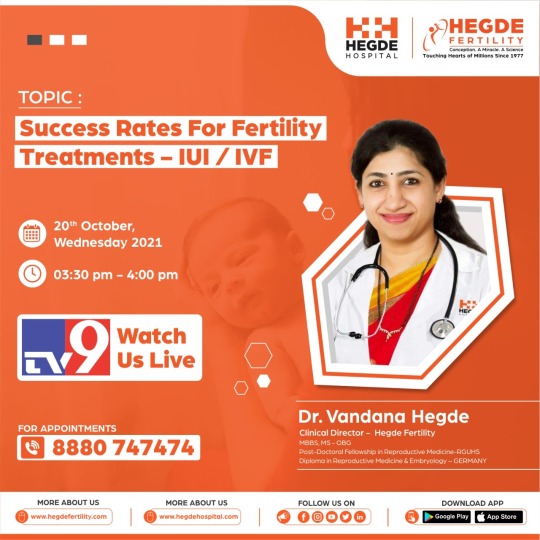
The probability of success with IVF and other fertility treatments depends upon several factors, such as the women's age, the cause of infertility, the quality of eggs retrieved, and the quality of the semen.
To know more about SUCCESS RATES FOR FERTILITY TREATMENTS - IUI/IVF, watch the live session lead by the Clinical Director of Hegde Fertility and eminent Consultant Reproductive Medicine Specialist Dr. Vandana Hegde, this Wednesday (20-10-2021) from 03:30 pm to 04.00 pm on the TV9 news channel.
📷: www.hegdefertility.com/dr-vandana-hegde/
📷: 8880 747474
#hegdefertility#iui#ivf#iuitreatment#ivfsuccess#iuisuccess#ivftreatment#infertilitytreatment#infertilityspecialist#infertilitydoctor#fertilityjourney#infertilityjourney#infertilitysupport#infertilitywarrior#ttcsupport#ivfcommunity#womenshealth#fertilityawareness#fertilitytreatment#infertilitycommunity#tryingtoconceive#fertilitysupport
0 notes
Text
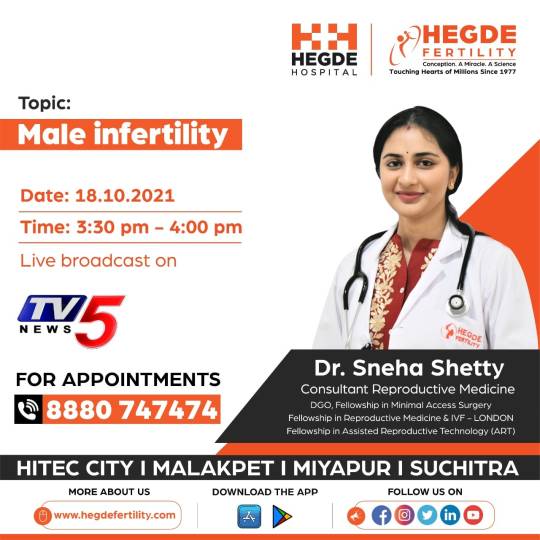
Studies found that 40% of infertility cases are related to men. Many factors to consider when diagnosing and treating male infertility include sperm count, morphology (shape), motility (movement), and DNA damage or genetic defects in sperm cells. The condition can be diagnosed with a semen analysis and treated by altering certain lifestyle factors and medications.
To know more about male infertility, watch the live session lead by Dr. Sneha Shetty, Consultant Reproductive Medicine, on 18th October at 3:30 PM on TV5 News Channel.
📷: www.hegdefertility.com/dr-sneha-shetty
📷: 8880 747474
#hegdefertility#maleinfertility#spermcount#lowspermcount#abnormalsperm#spermmorphology#spermmotility#infertility#infertilityawareness#infertilitysupport#infertilitycommunity#infertilitytreatment
0 notes
Text

Do you have a question about your fertility?
Please don't hesitate, comment or message your question to us!
📷: www.hegdefertility.com
📷: 8880 747474
#hegdefertility#askhegdefertility#askdoctor#fertility#infertility#infertilityfaqs#fertilityfaqs#infertilitytreatment#fertilitytreatment#iui#ivf#ivftreatment#fertilityquestions#fertilitydoubts#askspecialist
0 notes
Text
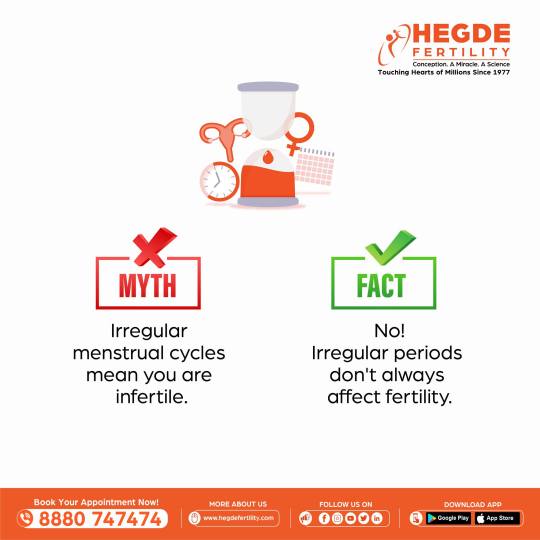
Women with irregular periods can still get pregnant and have healthy babies. Irregular menstrual cycles make it difficult to determine the most fertile window but do not always mean infertility.
It would be best to discuss any irregularities in your cycle with one of our specialists to help you get pregnant with the right diagnosis and right treatment.
📷: www.hegdefertility.com
📷: 8880 747474
#hegdefertility#irregularperiods#irregularmenstrualcycles#fertilityspecialist#infertilityspecialist#fertilitysupport#infertilitytreatment#fertilityjourney#infertilitysupport#infertilityawareness#women
0 notes
Text

The first IVF baby was born in 1978. Since then, millions of childless parents have been blessed with babies using ART treatments like IVF. The majority of the babies born through IVF are perfectly healthy. The procedure does not pose any short-term or long-term risk to the health of the child. The only difference between IVF babies and normal babies is the procedure of conception and fertilization.
To know the detailed procedure of IVF, please check the link below: https://hegdefertility.com/conventional-ivf/
0 notes
Text
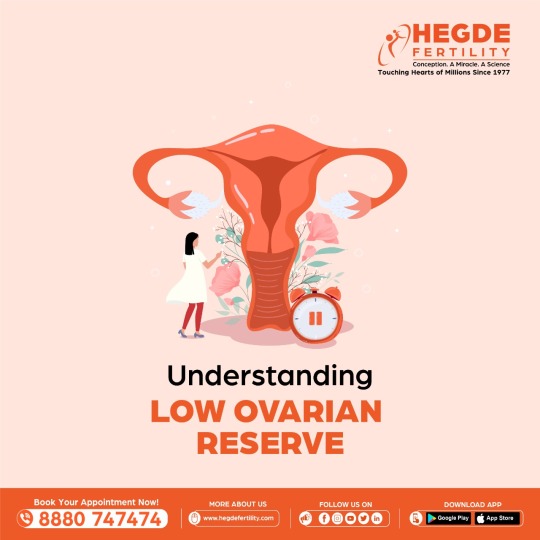
Did you know that women are born with about 1-2 million eggs? By the time they reach puberty, they have about 3-5 lakh eggs that can respond to hormones, grow, and ovulate. As the years go by, women's egg quality decreases; after 30 years, this decline becomes more rapid than before!
In recent decades, the average women in India having children in their 30s due to their education and career or personal reasons. However, we all know fertility decline with age. As the quantity of eggs decreases, there is also a qualitative decline in egg quality which affects embryo quality leading to early pregnancy abortions and increased risk of aneuploidy (chromosomal abnormalities like down's syndrome or spina bifida).
The term "ovarian reserve" refers to the number and quality of your eggs (oocytes). The more quality eggs you have in your ovulation cycle, the higher your chance of getting pregnant. Low ovarian reserve means that you have fewer eggs than expected for your age, and therefore, those remaining eggs have a poor response to ovarian stimulation. It is one of the most important factors in female infertility. It is often noted in women in their mid to late thirties, but it may also affect younger women.
It is essential to remember that many women with even low ovarian reserve can conceive with their eggs. Some may require individualized treatment based on their ovarian reserve status.
If you would like to learn more about the low ovarian reserve or understand if your egg supply could affect your fertility, you can make an appointment with one of our fertility specialists by calling +91 8880747474 or booking online.
📷: www.hegdefertility.com
📷: 8880 747474
#hegdefertility#ovarianreserve#femaleinfertility#ovarianhealth#infertilitysupport#infertilityproblems#infertilitycauses#reproductivemedicine#ttc#womenshealth#infertilityawareness
0 notes
Text

Even today, infertility is still a social stigma, which leads people to be embarrassed to discuss it. It's one of the reasons why there are so many myths surrounding it.
Don't suffer in silence! Ask us what you want to know regarding infertility.
📷: www.hegdefertility.com
📷: 8880 747474
#askus#infertilityawareness#infertility#infertilitysupport#infertilitycauses#infertilitytreatment#ivftreatment#reproductivemedicine#ttc#womenshealth
0 notes
Text
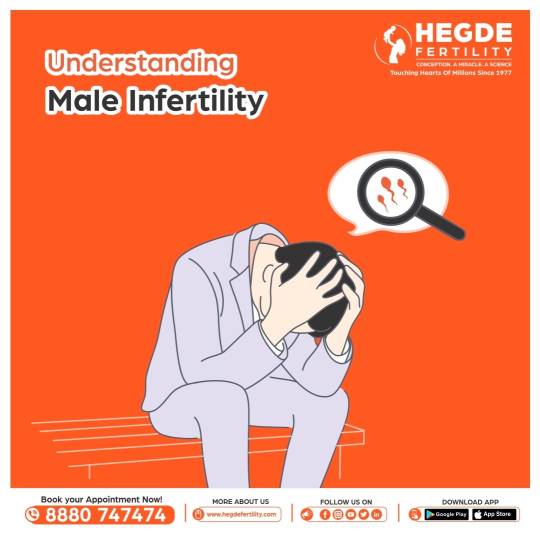
Even today, discussions about male infertility are rare. It is taboo and can cause trauma and stress, especially in Indian society, where child-bearing is very important. Studies found that 40% of infertility cases are related to men.
Many factors to consider when diagnosing and treating male infertility include sperm count, morphology (shape), motility (movement), and DNA damage or genetic defects in sperm cells. The condition can be diagnosed with a semen analysis and treated by altering certain lifestyle factors and medications.
Visit your doctor regularly to keep track of your health and take actions to prevent the issues beforehand.
Men must be aware and understand male infertility to obtain early diagnosis and treatment when necessary. To know more about male infertility, check the link below: https://bit.ly/3tIPRLB
#hegdefertility#infertilityspecialist#malefertility#maleinfertility#spermcount#malefertilitytreatment#menshealth#sperm#mensfertility#sperms#spermmotility#menfertility#maleinfertilityfactors#malefertilitytest#reproductivehealth#fatherhood#mensinfertility#maleinfertilitycauses#spermquality#maleinfertilityreasons#maleinfertilitytypes#spermhealth#maleinfertilityfoods
0 notes
Text
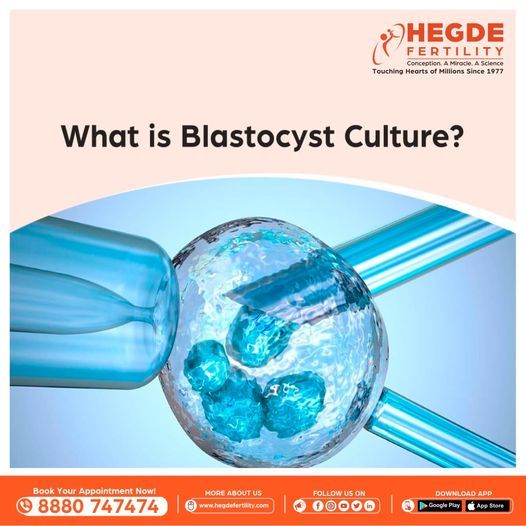
Blastocyst Culture is a stage where the embryos are developed in the laboratory for 5-6 days after fertilization and later transferred into the uterus. These embryos are called Blastocysts. At this stage of Blastocyst, cell division raises more than 100 cells, which are more advanced than day 3 embryos.
Not all embryos will survive for 5-6 days in the laboratory, the embryos which are survived to this stage are more likely to implant. With recent advancements in culture media, the implantation rate in blastocysts is 60% compared to day 3 embryo transfer which is 40%.
📷: https://hegdefertility.com/blastocyst-culture/
📷: 8880 747474
#hegdefertility#blastocystculture#blastocyst#blastocysts#blastocysttransfer#blastocystembryotransfer#blastocystimplantation#ivfprocess#ivfprocedure#embryotransfer#eggfertilization#ivfembryotransfer#fertilization#ivfsuccess#ivfpregnancy#ivftransfer#ivficsi#ivftreatment#ivfcycle#ivfawareness
0 notes
Text
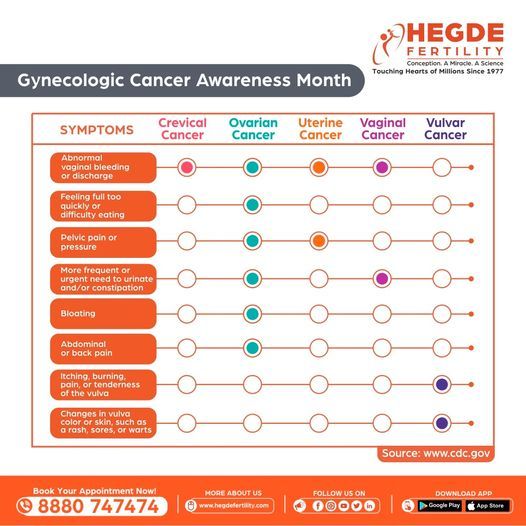
Every year, September is observed as the Gynecologic Cancer Awareness Month, aiming to encourage women globally to learn and understand gynecologic cancer (cervical, ovarian, uterine, vaginal, and vulvar cancers).
Understanding common gynecologic cancers will help women take preventive steps. Like many other cancers, if you detect gynecologic cancer early, you have a better chance of treating it. Consult the Gynecologic oncologists if you find any potential symptoms listed in the below infographic.
📷: www.hegdefertility.com
📷: 8880 747474
0 notes
Text

On this auspicious day of Janmashtami, may little Krishna come to your house and light the lamp of happiness.
Happy Krishna Janmashtami!
📷: www.hegdefertility.com
📷: 8880 747474
#hegdefertility#krishnajanmashtami#janmashtami2021#janmashtami#happyjanmashtami#fertilitycentre#fertilityexperts#fertilitydoctors#ivf#ivftreatment#ivfsupport#fertilitysupport#infertilitytreatment#fertilityjourney#infertilitysupport#infertilityspecialist#arttreatments#ivfsuccess#ivfprocedure#infertilityawareness
0 notes
Text
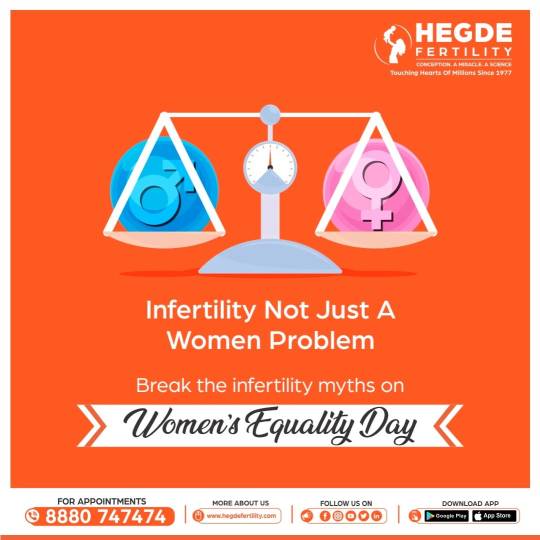
Infertility is not just a women's issue. Both men and women can contribute to infertility. According to WHO, the malefactor contributes to around 40% of all infertility cases. Let us break the infertility myths on Women's Equality Day!
📷: www.hegdefertility.com
📷: 8880 747474
#hegdefertility#womenequalityday#womenequalityday2021#women#genderequality#infertility#infertilitymyths#malefactorinfertility#maleinfertility#femaleinfertility#infertilityfacts
0 notes
Text
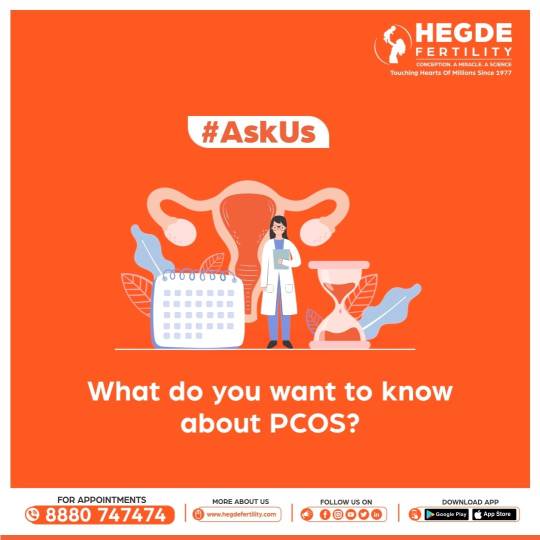
Polycystic ovary syndrome (PCOS) is a prevalent condition affecting nearly 5% to 10% of women aged 12–45 years because of hormonal imbalance. It can cause problems with your menstrual period and make it difficult for you to conceive.
Comment or DM your queries to us!
📷: www.hegdefertility.com
📷: 8880 747474
#hegdefertility#askhegdefertility#pcos#pcosjourney#pcoswarrior#pcossupport#ttcwithpcos#pcosawareness#pcosttc#pcosfertility#pcostreatment#pcosinfertility#fertilityjourney#ttccommunity#polycysticovarysyndrome
0 notes
